
CZECH JOURNAL OF FOOD SCIENCES
Scope & Guideline
Fostering Collaboration in Food Science Innovation
Introduction
Aims and Scopes
- Food Safety and Microbiology:
Research focusing on the detection and control of foodborne pathogens, spoilage organisms, and the impact of preservation methods on food safety. - Nutritional Science:
Investigations into the nutritional composition of food products, including studies on bioactive compounds, dietary supplements, and the health implications of various food ingredients. - Food Quality and Technology:
Development and optimization of food processing techniques, including rheological properties, shelf-life studies, and the use of innovative materials to enhance food products. - Natural Additives and Functional Foods:
Exploration of the use of natural ingredients, such as plant extracts and essential oils, for improving food quality, safety, and health benefits. - Consumer Science and Sensory Evaluation:
Studies evaluating consumer preferences, sensory attributes, and market trends related to food products.
Trending and Emerging
- Sustainable Food Practices:
Increasing focus on sustainable practices, including the use of local ingredients and environmentally friendly processing techniques, as the industry responds to growing consumer demand for sustainability. - Functional Foods and Nutraceuticals:
A rising interest in foods that provide health benefits beyond basic nutrition, including studies on probiotics, antioxidants, and their roles in disease prevention. - Nanotechnology in Food Science:
Emerging research on the application of nanotechnology for food safety, quality enhancement, and packaging solutions that improve shelf life and reduce waste. - Alternative Proteins and Food Sources:
Significant attention is being directed towards alternative protein sources, such as plant-based and lab-grown meats, driven by changing dietary preferences and environmental concerns. - Food Innovation and Product Development:
An increase in research focused on the development of new food products, including the optimization of formulations and technological advancements in food processing.
Declining or Waning
- Traditional Food Processing Techniques:
Research on conventional methods of food preservation and processing has decreased, possibly due to the rise in interest in innovative technologies and methods that offer enhanced efficiency and safety. - Chemical Contaminants in Food:
Research on the detection and analysis of chemical contaminants, while still relevant, has been less prominent in recent issues as the focus shifts towards more holistic approaches to food safety. - Historical and Cultural Aspects of Food Science:
Studies emphasizing the traditional practices and historical context of food science have waned, perhaps overshadowed by a greater emphasis on modern scientific methods and technological advancements.
Similar Journals
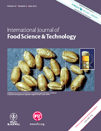
INTERNATIONAL JOURNAL OF FOOD SCIENCE AND TECHNOLOGY
Connecting Researchers to the Heart of Food ScienceINTERNATIONAL JOURNAL OF FOOD SCIENCE AND TECHNOLOGY, published by WILEY, serves as a premier platform for the dissemination of cutting-edge research in the field of food science and technology. With an ISSN of 0950-5423 and E-ISSN 1365-2621, this journal has been committed to publishing high-quality research since 1966 and is set to continue its impactful contributions through 2024. Recognized for its excellence, it holds a Q1 ranking in Food Science and a Q2 ranking in Industrial and Manufacturing Engineering as of 2023. The journal ranks #95/384 in Industrial and Manufacturing Engineering and #100/389 in Food Science on Scopus, placing it within the top quartiles of these fields. Although it does not currently offer Open Access, researchers and professionals benefit from access to a wealth of knowledge that advances understanding in both applied and theoretical aspects of food science. This journal is indispensable for anyone in the academic and professional domains who seeks to stay abreast of innovations and trends shaping the food industry.

International Food Research Journal
Advancing Food Science Through Innovative ResearchThe International Food Research Journal, published by UNIV PUTRA MALAYSIA PRESS, serves as a pivotal platform for disseminating innovative research within the field of food science. With an ISSN of 1985-4668 and an E-ISSN of 2231-7546, the journal has successfully established its presence since its inception in 2007, converging its findings through 2024. This esteemed journal holds a Q3 ranking in Food Science, illustrating its valuable contributions to the field as demonstrated by its Scopus rank of 276 out of 389, placing it in the 29th percentile among its peers in Agricultural and Biological Sciences. Although it operates under a traditional publishing model, its academic integrity and focus on high-quality research ensure that it remains a vital resource for researchers, professionals, and students eager to explore advances in food technology, nutrition, and safety. By encouraging interdisciplinary collaboration and critical dialogue, the International Food Research Journal plays an essential role in shaping the future of food science research.
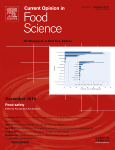
Current Opinion in Food Science
Unveiling the Latest Breakthroughs in Food ScienceCurrent Opinion in Food Science is a premier peer-reviewed journal published by ELSEVIER SCI LTD that focuses on the latest advancements and research in the domain of food science and technology. With its ISSN 2214-7993 and E-ISSN 2214-8000, this journal serves as a critical platform for researchers and professionals to share insights and opinions on emerging trends, innovations, and challenges faced in food science. The journal enjoys an impressive impact factor and ranks in the first quartile (Q1) in both Applied Microbiology and Biotechnology and Food Science, symbolizing its influence and reputation in the field. It is strategically located in the Netherlands and conducts its academic dialogue with a broad scope that includes essential topics in food safety, nutrition, and sustainable practices. Operating from 2015 to 2024, the journal has established itself as a critical resource for the global academic community, boasting excellent Scopus rankings—#9 out of 389 in Food Science and #6 out of 127 in Applied Microbiology and Biotechnology—indicating its high relevance and impact. Readers can look forward to insightful articles and comprehensive reviews that bridge the gap between fundamental research and practical application in the ever-evolving food science landscape.

Acta Scientiarum Polonorum-Technologia Alimentaria
Unveiling Cutting-Edge Discoveries in Food ScienceActa Scientiarum Polonorum-Technologia Alimentaria, published by Poznan University of Life Sciences, is a revered journal in the field of food science, showcasing cutting-edge research and innovations in food technology. Established as a leading platform within its domain, this journal is indexed under Scopus and ranks in the 2023 Q3 quartile for Food Science, demonstrating its commitment to high-quality scholarship. With an ISSN of 1644-0730 and E-ISSN 1898-9594, it serves as a critical resource for researchers, professionals, and students seeking to stay at the forefront of advancements in food safety, quality control, and sustainable practices. The journal has also been recognized for its contributions to the agricultural and biological sciences, positioning itself at rank #205 out of 389 in this competitive field. While currently not offering open access, the journal's valuable insights and findings, especially as it publishes through 2024, play a crucial role in advancing knowledge and fostering collaboration among experts in the food science sector.

FOOD TECHNOLOGY
Connecting Experts with Cutting-Edge ResearchFOOD TECHNOLOGY, published by the Institute of Food Technologists, is a pivotal journal dedicated to the advancement of knowledge and innovation in the food industry. With its ISSN 0015-6639, this esteemed publication aims to bridge the gap between food science research and practical applications, addressing ongoing challenges and technological advancements in food production, preservation, and safety. Although currently not an open-access journal, FOOD TECHNOLOGY continues to serve as a critical resource for food scientists, engineers, and industry professionals seeking to stay at the forefront of emerging trends and research in the field. Recognized for its impact within the academic community, it holds a Q4 ranking in Chemistry, Food Science, and Industrial and Manufacturing Engineering categories, reflecting its importance in disseminating valuable information. Researchers and practitioners alike will find in its pages a wealth of insights that can influence practices and policies in food technology. The journal's editorial team, committed to upholding rigorous standards, ensures that each issue is a thorough representation of high-quality research and a valuable addition to the body of food science literature.

ITALIAN JOURNAL OF FOOD SCIENCE
Cultivating a Global Dialogue on Food ScienceITALIAN JOURNAL OF FOOD SCIENCE is a distinguished open-access publication dedicated to advancing knowledge in the field of food science, catering to a global audience of researchers, professionals, and students. Published by Codon Publications in Singapore, this journal, operating under the ISSN 1120-1770 and E-ISSN 2239-5687, has been a vital platform for scholarly discourse since its inception in 1996, converging towards a comprehensive view of food science trends through 2024. With an impressive ranking in the third quartile (Q3) of the Food Science category and a Scopus rank of #151 out of 389, the journal plays a significant role in disseminating high-quality research, contributing to a richer understanding of food science within the agricultural and biological sciences. Since transitioning to open access in 2008, it has further expanded its reach, ensuring that innovative research is accessible to all, thereby fostering collaboration and knowledge exchange in this vital industry.
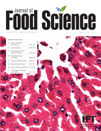
JOURNAL OF FOOD SCIENCE
Empowering Food Professionals with Cutting-Edge ResearchJOURNAL OF FOOD SCIENCE, published by Wiley, is a premier journal dedicated to advancing the field of food science, bridging the gap between fundamental research and practical application. With an impressive impact factor reflecting its authoritative status, the journal is ranked in the Q1 quartile for Food Science in 2023 and boasts a Scopus ranking of #71 out of 389, placing it in the 81st percentile within Agricultural and Biological Sciences. First launched in 1936, the journal continues to serve as an essential platform for researchers, professionals, and students to disseminate innovative studies and reviews that address critical issues in food quality, safety, and technology. While not currently offering open access, its rigorous peer-review process ensures the dissemination of high-quality and impactful research. Researchers engaged in the vital disciplines of food science will find this journal indispensable for keeping abreast of cutting-edge developments in the field.
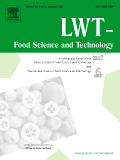
LWT-FOOD SCIENCE AND TECHNOLOGY
Advancing food safety and innovation.LWT - Food Science and Technology is a premier academic journal published by Elsevier, specializing in the multifaceted fields of food science and technology. With a distinguished presence since its inception in 1973, this journal has evolved to become a vital resource for researchers and professionals aiming to advance knowledge in food safety, preservation, processing, and sensory analysis. Currently ranked in the Q1 quartile of food science journals, it holds an impressive Scopus ranking of 22 out of 389 in the Agricultural and Biological Sciences category, placing it in the 94th percentile. While certain articles may be available via subscription, LWT is committed to disseminating cutting-edge research that enhances food quality and innovation. This journal not only serves as a critical platform for the exchange of scientific ideas but also addresses contemporary challenges in food technology, ensuring that it remains essential for scholars, industry professionals, and students alike seeking to contribute to and stay abreast of advancements in the field.
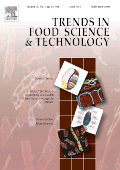
TRENDS IN FOOD SCIENCE & TECHNOLOGY
Unveiling the latest advancements in food science.Trends in Food Science & Technology, published by Elsevier Science London, stands as a premier journal in the fields of food science and biotechnology. With an impressive Q1 ranking in both the food science and biotechnology categories, it is recognized for its rigorous peer-reviewed articles that advance knowledge and innovation in the sector. The journal’s Scopus rankings validate its significance, placing it in the top percentile among its peers, with a remarkable rank of #2 out of 389 in Agricultural and Biological Sciences - Food Science, and #4 out of 311 in Biochemistry, Genetics, and Molecular Biology - Biotechnology. Since its inception in 1990, the journal has become a vital resource for researchers, professionals, and students alike, offering insights into contemporary challenges and trends impacting food technology. Although it operates under a subscription model, the quality of research published within its pages makes it an essential read for anyone involved in advancing the science of food.
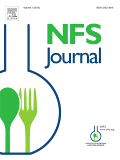
NFS Journal
Connecting scholars and practitioners through impactful research.NFS Journal, published by ELSEVIER, is at the forefront of research in the fields of Food Science and Nutrition and Dietetics, boasting an impressive impact factor that underscores its significance. With an Open Access model since 2015, the journal facilitates widespread dissemination and accessibility of high-quality research, making it a valuable resource for scholars and practitioners alike. Located in Germany, this journal has made its mark with its prestigious Q1 ranking in both Food Science and Nutrition and Dietetics as of 2023, positioning it among the top-tier journals in these disciplines. Additionally, it holds an outstanding standing in Scopus rankings, being placed at 10th out of 140 in Nutrition and Dietetics and at 27th out of 389 in Food Science, reflecting its influence and reach within the global academic community. The NFS Journal is dedicated to publishing the latest advancements and practices that shape our understanding of the relationship between food, health, and nutrition, appealing to researchers, professionals, and students eager to stay updated with novel insights and breakthroughs.